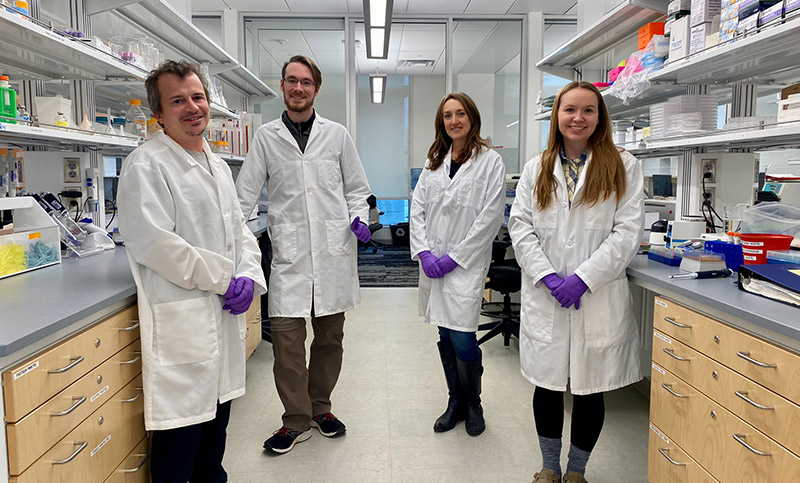Overeating and the holidays: a psychologist’s perspective
December 20, 2022 - Shelly DeJong
Pictured: Dr. Alex Johnson, Nathan Pence (lab manager), Dr. Jenna Lee (post-doc), and Lauren Raycraft (Ph.D. student)
Why is it that we often overeat during the holidays? How can some people always seem to make room for an extra slice of pie?
Psychology professor Dr. Alex Johnson and his team of researchers know just how complex the answers are to those questions. From genetics to chemicals to environmental cues, there are a lot of factors that make a difference in why and how people eat.
When it comes to overeating behavior, “people think it is just eating less, exercising more,” said Dr. Johnson. ‘But that mantra is not helpful. It ignores the fact that there are so many complex systems in place.”
Dr. Johnson’s lab looks closely at the lateral hypothalamic area, an area of the hypothalamus in the brain that receives signals from the gut about satiation and hunger levels. It is also intertwined with areas that regulate motivation, reward, learning, and goal-driven behavior. Dr. Johnson describes this area as a conduit that integrates a variety of sources of information from within the brain and the body and allows humans and animals to make decisions that influence their ingestive behavior.
“People are continually bombarded with food-related decisions,” said Dr. Johnson.
You may be surprised to learn that an average person makes 200 food decisions every day—and many of those decisions happen beyond our cognitive awareness.
Dr. Johnson stressed that we implicitly learn about food and food-related cues, and this can shape our behaviors and dietary choices. The famous conditioning experiment, Pavlov’s Dogs, showed that environmental cues often drive our food decisions. In the experiment, Ivan Pavlov paired a neutral cue, a bell, with food. He then showed that when he rang the bell, the dogs started salivating even though the food wasn’t present. Those cues alone were able to control the behavior of the dogs.
Similarly, just by seeing the McDonald’s arches on your way home from work, you may end up going through the drive-through before you’ve even consciously made the decision.
Dr. Johnson’s lab has been able to model these ideas in lab rats and mice. In one experiment, animals that were not hungry were presented with a sugary treat and they chose not to eat it. The researchers then presented a cue to the animals, and they saw a big increase in their eating behavior. Dr. Johnson said that this is a model that we can think of as learned overeating.
“This shows us how vulnerable we are to the basic manipulations of cues and their associations with rewarding events like foods,” said Dr. Johnson. “Environmental cues have a lot of control over regulatory processes like feeding and energy intake. They do so in part through overriding and integrating into our natural reward systems.”
The Cues at Holiday Parties
The holidays are often filled with cues telling us to eat. Hanging out with friends and family in a pleasant environment with tasty food nearby, we’re likely to end up eating more than our bodies need.
But the good news is that Dr. Johnson doesn’t see that being a problem in the short term. He acknowledged that the data shows that the U.S. and European populations generally put weight on during these winter months, but often the weight restabilizes in the early spring months.
“It’s really beneficial for us to enjoy ourselves when we can,” said Dr. Johnson. “We all live very stressful and complex lives. It’s great to spend time enjoying and being a little indulgent with what we choose to engage in.”
He added that there are many psychological phenomena at play in these types of situations that may determine your likelihood to ingest more than you might normally. In addition to the food environment, our genetics shape our interactions with food. For example, certain rats are more genetically predisposed to overeat sweet treats—this also extends to humans.
However, for those that want to avoid overindulging in those hedonic holiday foods, it is important to consider these environmental and physiological factors that play a pivotal role in guiding food choices. For instance, Dr. Johnson suggests focusing deliberately on savoring each bite, this will help provide time for those satiation signals in your gut to activate and make it less likely that you choose that extra slice of pie.


